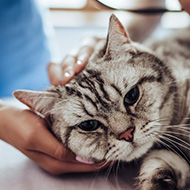Study explores ionized hypercalcaemia in cats

Study provides clear clinical information on causes associated with disrupted calcium concentrations.
A Royal Veterinary College (RVC) study has highlighted the more common diagnoses associated with ionized hypercalcaemia in cats.
The researchers found that the three most likely causes of ionized hypercalcaemia were kidney-related causes, neoplasia (abnormal growths) and idiopathic hypercalcaemia (high blood calcium).
Using the RVC VetCompass programme to collect data, the research team gathered and analysed the largest data set of cats with ionized hypercalcaemia as yet reported in literature to explore the different pathological causes.
In just over half of the 238 cases, a defined pathological cause was identified, these were acute kidney injury (13 per cent), malignancy associated (10.1 per cent), idiopathic hypercalcaemia (10.1 per cent) and chronic kidney disease/renal diet associated (8.4 per cent).
Researchers found a marked variability in total hypercalcaemia by diagnosis, highlighting the importance of ionised calcium measurement if hypercalcaemia is differential for a patient's clinical signs.
The study also explores the prevalence of concurrent urolithiasis, with urolithiasis identified in 83.3 per cent of acute kidney injury associated hypercalcaemia, 72.7 per cent of iatrogenic hypercalcaemia, 61.1 per cent of CKD/renal diet-associated hypercalcaemia and 50 per cent of idiopathic hypercalcaemia cases imaged.
Given this high proportion of hypercalcaemic cats with concurrent urolithiasis, the research team has suggested that further studies into calcium-based urolith formation are needed.
'Ionized hypercalcaemia in 238 cats from a referral hospital population (2009-2019)' is published in the Journal of Veterinary Internal Medicine.



 The latest
The latest